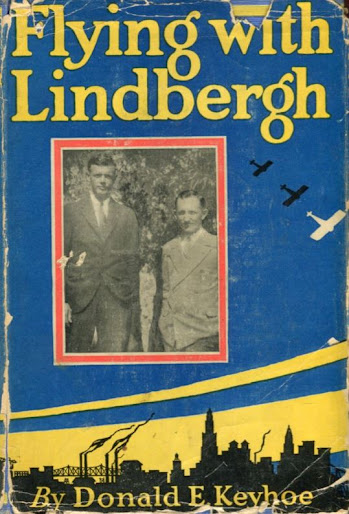Dateline: August 1, 1956, Location: near Amarillo, Texas
J. G. Kirby was in his mid-thirties, he'd started a family after his stint as a bomber pilot with the Eight Air Force during World War II. Kirby was considered an expert in rare gems and minerals, writing about one of his rock-hunting discoveries in the article "90 lb. Texas Plume Agate Found,” for The Lapidary Journal.
 |
| Unconfirmed, but likely photo of our J. G. Kirby |
Mr. and Mrs. Kirby and two their two children had been on a rock-hunting expedition in Colorado. During the long overnight drive home, they saw and photographed a UFO in the pre-dawn hours of August 2, 1956. Once home, he developed the film and reported the sighting to the authorities. Excerpts from the Air Force report dated Aug. 23, 1956, Unidentified Flying Object (UFOB):
“Kirby advised that on 1 August 1956 as he was returning to Dallas, Texas from Colorado Springs, Colorado, via Amarillo …he noted a bright green trajectory in the sky… from an object…
The phenomenon appeared to be the [angular] size of a grapefruit and appeared in brilliance equal to the ignition of phosphorus, giving a brilliant beam of light both above and below the phenomenon itself, but never both beams simultaneously. … The object was observed intermittently by Kirby and his wife between Amarillo and Memphis, Texas. Kirby related that they departed Amarillo at 0400 hours and arrived at Memphis at 0615 hours.”
“The object appeared to be extremely navigable, inasmuch as it appeared in various places in the cloud formation… upon his arrival at Memphis, Texas, the formation had begun to disintegrate. As daylight approached, the phenomenon appeared to be ascending into the heavens, where it was the approximate size of a star and no longer visible through the clouds… in his [wartime] experience with aircraft, weather conditions, etc., he had never observed anything comparable with this phenomenon.”
Kirby photographed the object with a Kodak 620 camera, according to the later Associated Press story, "shot a whole roll of film." He turned over two photos for analysis, but retained the negatives, so they were not examined.
For some reason this the report was “pigeonholed” in Fort Worth, Texas at the Office of Special Investigations at Carswell Air Force Base until the end of the year. It was the newest of six “OSI UFOB Reports” ranging from Feb. 1954 to Aug. 1956, finally forwarded to Project Blue Book on Dec. 26, 1956. Capt. George T Gregory noted in a memorandum, “the very late date of receipt makes investigations or conclusive analysis difficult, if not impossible.” Still, they gave it a shot, and their analysis determined:
“A microscopic examination discloses that the photo is not ‘doctored’ and apparently not an emulsion flaw. The absence of any horizon, objects or perspective for contrast or comparison purposes makes analysis somewhat difficult. In the opinion of this office… the trail shown here appeared to be similar to those left and the wake of missiles.” However, the analysis noted, “the closest missile launching site to the observer’s location is white sands, New Mexico, a distance of approximately 300 miles from Amarillo."
No conclusion was reached beyond the suggestion the photo was either of a missile trail or a hoax. Independently, Joseph J. Keeley, Security Officer for the University of Michigan Engineering Research Institute, volunteered analysis from a faculty member, who noted that Kirby was a lapidarist, and he was, “of the opinion that it is a trick photograph made with stones.”
The Disclosure to the Public
Once the Project Blue Book investigation was done, Kirby released the photo to the press, who reported, “he said authorities told him only recently he no longer had to keep the photo and story quiet.”
 |
The Eagle, Nov. 11, 1957 |
The Texas Bank and Trust in Dallas seized on the opportunity to exploit the publicity. They created an exhibit in their drive-in lobby and advertised in the Dallas Morning News, Nov. 4, 1957. Air Force files mentioned only 2 photos, but the bank claimed to have 6:
See First Actual Pictures of Unidentified Flying Object
Sighted near Amarillo August 2, 1956, and held secret until now. Actual photographs by a Dallas resident as seen in yesterday's front page. Described by the U.S. Air Force as a “navigable object,” these 6 pictures which have been closely guarded for the last year will be on display beginning this morning in Texas Bank’s Drive-Through Auto-ramic lobby.
NICAP’s The UFO Investigator, Jan. 1958, got overexcited about the secrecy aspect of the photo in their article, “Air Force Denies UFO Witnesses Muzzled Despite Order in Dallas.” Wanting to expose the cover-up, they said, “NICAP requests that anyone who has been silenced in regard to UFO information who is not in the armed forces send the details to this Committee.”
The inaccurate accusations of secrecy were repeated by George D. Fawcett a few years later in “The Flying Saucers are Hostile,” in Ray Palmer’s, Flying Saucers magazine, Feb. 1961.
In response to a 1960 inquiry about the case, Maj. Lawrence J. Tacker replied:
“The Air Force file carries no conclusion on the photograph taken by Mr. J.G. Kirby near Amarillo, Texas on 2 August 1956. Not knowing what radiation vapor is, it is the Air Force opinion that some spokesman at the time speculated that the object was an irradiated vapor trail and was probably miss-quoted.
The Air Force is not aware of any release date for the photograph taken by Mr. Kirby. The original was in the hands of the owner and he was free to do with it as he pleased.”
There was a white lie in there. At the time, Air Force policy prohibited them from labeling witnesses as hoaxers. The case card for the Project Blue Book 26-page file summarized the case:
“Extenuating circumstances. No reference point in photo. Suspected hoax.”
 |
| The Project Blue Book 26-page file |



.jpg)






















